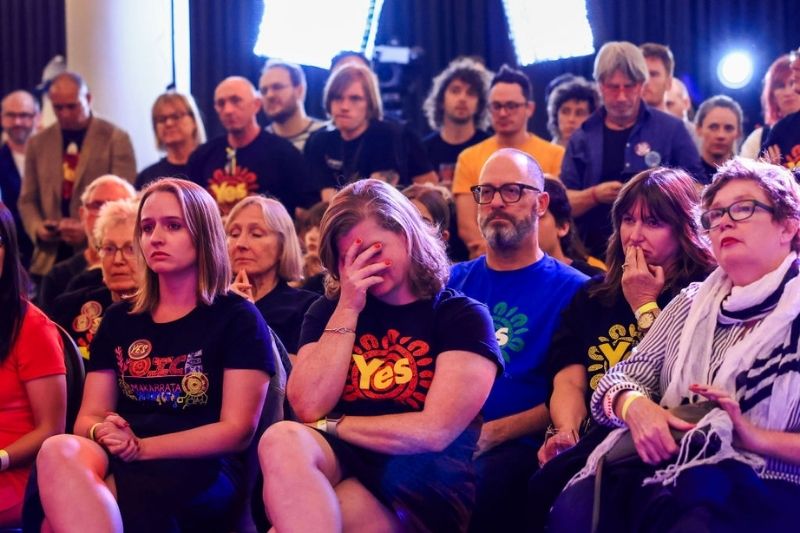The traditional detective story ends in the unveiling of the murderer and his being led off with mingled rage and shame before his now hostile acquaintances. We readers then need to entertain no thought for his family or for the person he so dastardly murdered. We are free to abandon themselves to the cleansing delights of vindication and blame.

Life, of course, is not like that. Or is it? The initial responses to two major events might make us wonder. Much of the initial comment on the sadly and emphatically rejected Referendum has been focused on who is to blame for conceiving it, calling it, supporting and opposing it, and for making it so acrimonious. In this festival of blame there is much talk about Indigenous Australians and their needs but little reaching out to them. They risk again being made the objects and not the agents of decisions about them, precisely the position that the Referendum was designed to correct. For many they are no more than the back story to the main performance of apportioning praise and blame by self-appointed judges who swell into the role.
Much coverage of the appalling killings of Israelis by Hamas forces and of the response to it by the Israeli military has also focused on laying blame. It has understandably fallen almost exclusively on Hamas. The conflict is depicted as one between saints and devils. In this apocalyptic view any action undertaken by Israel will be seen as justifiable and any resistance by people in Gaza will be categorised as provocation.
This portrayal obscures the humanity of the people harmed by the Hamas offensive and by the Israeli retaliation. They become white-robed martyrs to be painted on battle shields or expendable trash to be dumped in a strategic game. The living reality of their lives and of their intimate relationships with family, friends, with sellers in the markets, and with culture and place, is disregarded.
The problem and tragedy of this self-focused view is that the persons who are disregarded and their relationships do not disappear. When cut they bleed and their open wounds infect the societies of which they are part. After the Referendum Australia remains a nation with a history that saw its Indigenous inhabitants displaced and dispossessed, their descendants discriminated against and unequal by almost every measure of wellbeing. It remains a nation in which the prosperity of the majority has been made possible by the continuing disadvantage of its First Peoples. The Referendum was proposed as one way of recognizing this history and wound, and of moving towards reconciliation. Whatever its deficiencies, its defeat does no more than leave the national wound untended and visible in the unequal lives of the First Peoples.
Similarly, after the likely destruction of Gaza and the deaths of even more Israeli and Arab people in the fighting, Israel and Palestine will remain territories to which two peoples lay claim, divided between a powerful minority and a dispossessed majority living in penury. They will inherit more intense memories of hatred and violence that will infect surrounding nations. Its inheritance will be deeper wounds and more infection for which healing will be even more urgent.
'The proper response is one of respect and compassion for those to whom the referendum and the violence have brought suffering, and of decent self-restraint in analysis and blame.'
As in Australia, apportioning blame will be myopic and unhelpful. We should certainly reflect on the international interests involved in the Hamas invasion. We should also condemn the invasion and any disproportionate suffering caused to civilians in Israel and Gaza by acts of war. If this is moral equivalence, as it is sometimes called, it is based on the conviction that the life of each human being is equally unique and precious regardless of race, religion and nationality. That conviction divides human life from savagery.
In responding both to the defeat of the Referendum and to the conflict in Israel and Gaza we should focus first on the persons who are most affected by these events. These are the descendants of the First Peoples in Australia and the people whose lives have been destroyed and those afflicted by the violence in Israel and Gaza. The proper response is one of respect and compassion for those to whom the referendum and the violence have brought suffering, and of decent self-restraint in analysis and blame. Life is more than a detective story. It leaves us with responsibilities to build and rebuild just and peaceful relationships.
Andrew Hamilton is consulting editor of Eureka Street, and writer at Jesuit Social Services.
Main image: A woman reacts during a speech by Campaign Director of Yes 23 Dean Parkin at the Inner West for 'Yes2023' official referendum function at Wests Ashfield Leagues Club on October 14, 2023 in Sydney, Australia. (Jenny Evans/Getty Images)